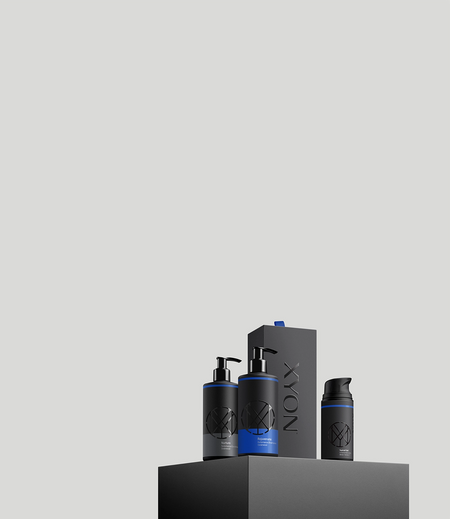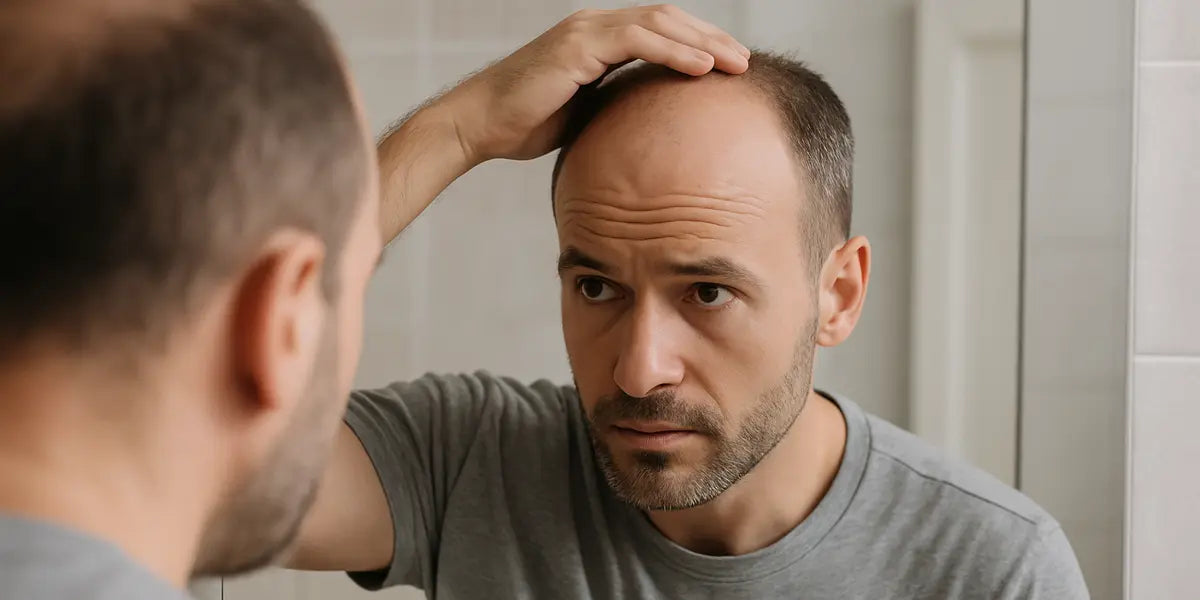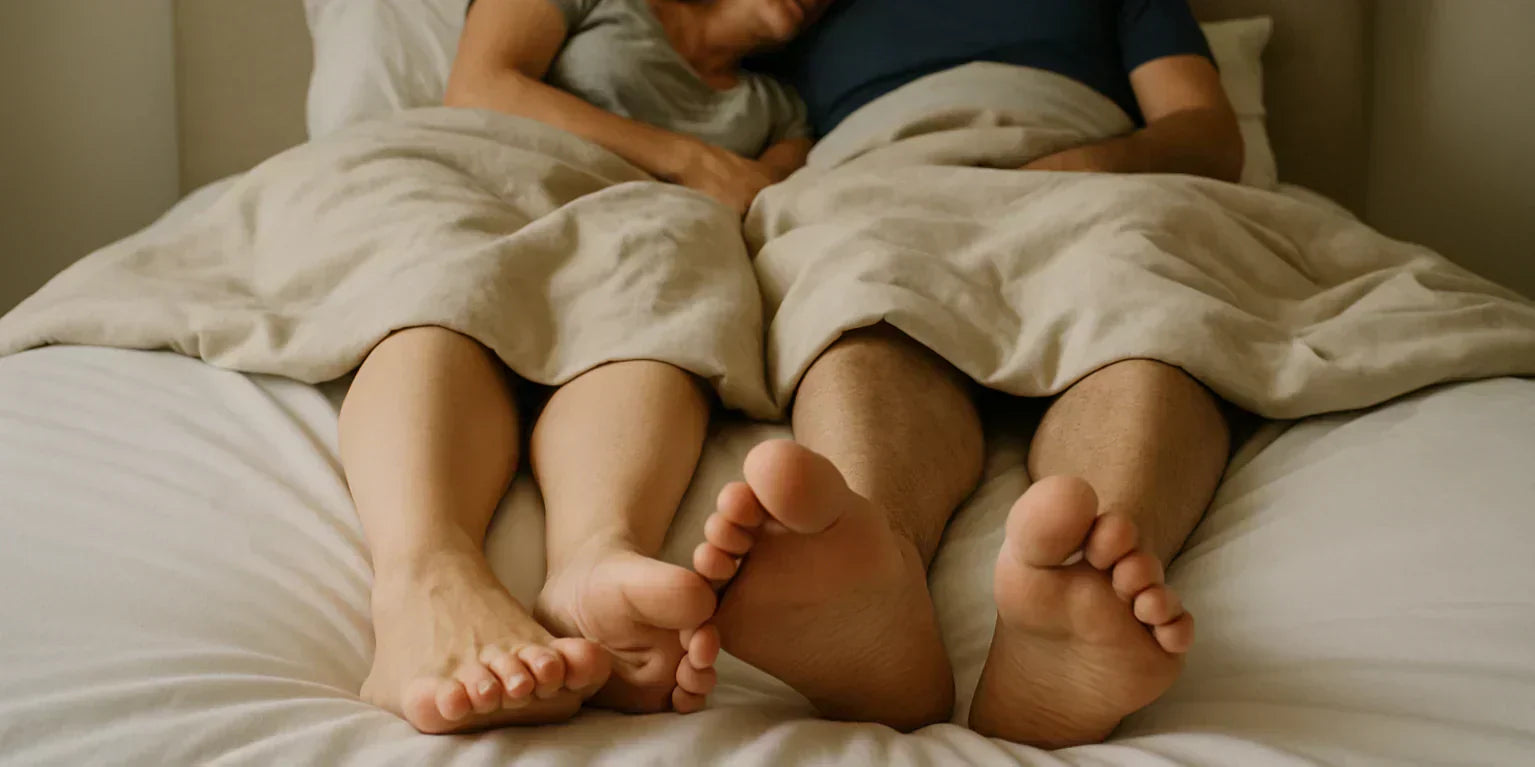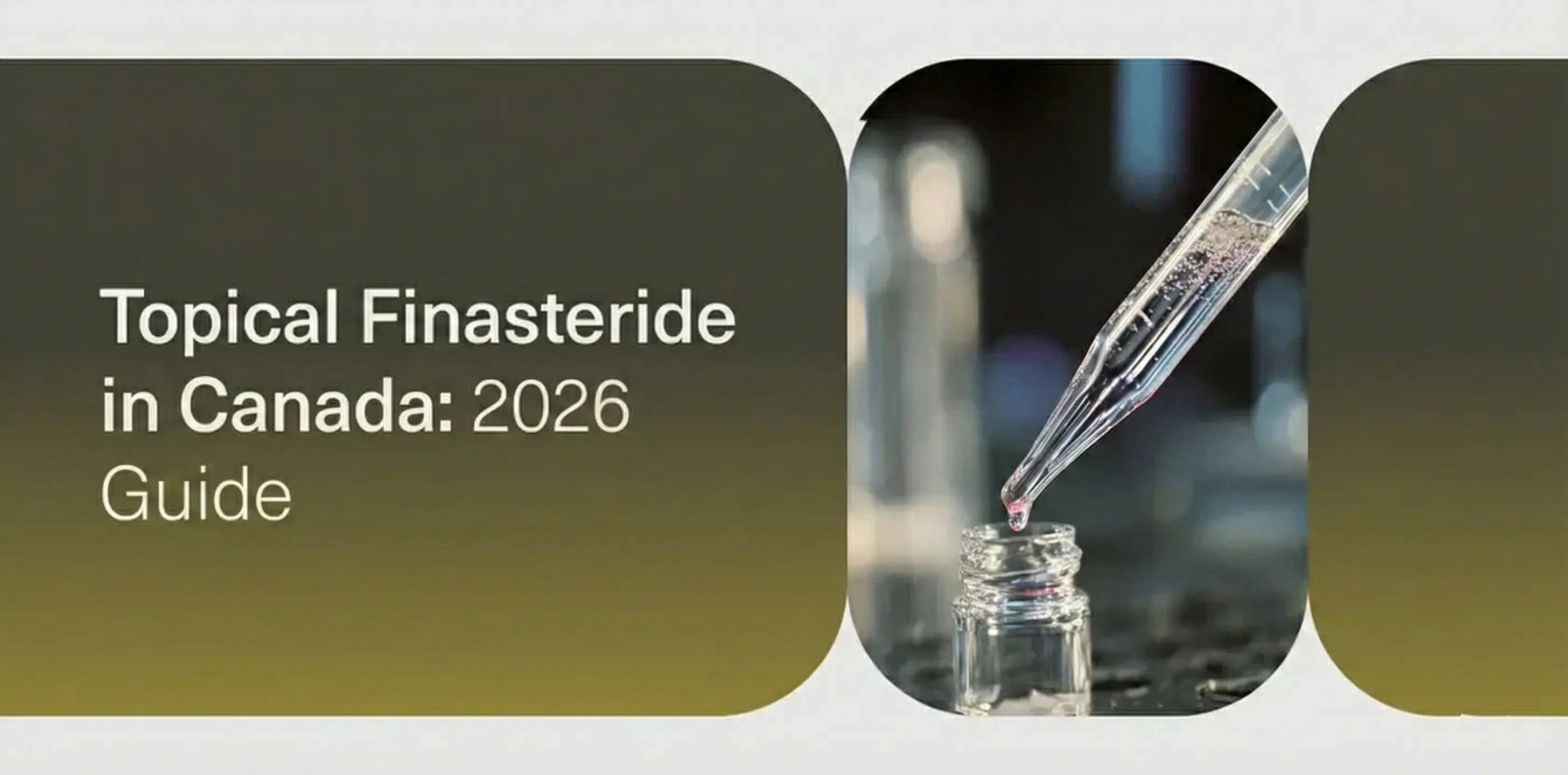For men experiencing hair loss, boosting confidence is often a priority. In this article, we’d like to offer some practical strategies to help change your outlook on hair loss and how you feel about yourself, for the better.
Is hair loss really that big of a deal?
The impact of hair loss is highly personal, but one thing is certain: it’s an extremely common problem. Androgenetic hair loss, also known as pattern hair loss, is said to affect up to 80% of males and 50% of females over the course of their lifetime (Piraccini & Alessandrini, 2014). It’s a genetic condition caused by an increased sensitivity of hair follicles to a hormone called dihydrotestosterone (DHT).
When DHT attaches to hair follicles, the hormone triggers a process called miniaturization, or shrinking. Typically, in men, hair follicles located along the hair line and at the very top of the head, or crown, are the most at risk for miniaturization. These areas are also where thinning and hair loss are most likely to occur.
Pattern hair loss isn’t life-threatening, but its emotional and psychological impacts can have a big impact on quality of life. Here’s a small sample of the research that’s been done on the psychosocial impacts of hair loss:
A 2019 study specifically examined these potential impacts in a group of men aged 21-30. The study used two assessment tools, the Dermatology Life Quality Index (DLQI) and Skindex-29, to assess the impact of hair loss in different areas of daily life. The DLQI is scored on a scale of 0-30, while a Skindex-20 score can range from 0-100. Researchers found that participants scored 13.52 on average on the DLQI, with the most strongly affected dimension being personal relationships. The average Skindex-29 score was found to be 75.62. From these results, researchers concluded that hair loss significantly affects quality of life (Gupta et al., 2019).
A more recent 2023 study provides additional support for the emotional and psychological burden of hair loss on people’s lives. In this study, the frequency and severity of depression were also measured using a tool called the Patient Health Questionnaire-9 (PHQ-9). Looking at the results, researchers found that over 50% of participants had higher levels of depression, and that depression was more common among female patients, married individuals, students, and younger patients. Nearly 20% of participants reported that hair loss had a notable impact on their quality of life (Alzoabi et al., 2023).
Hair loss is as big of a deal as you make it, but what we want to draw awareness to is that idea that it’s more than a vanity issue, it can have serious unseen impacts on individuals that go beyond hair.


Get the right solution for your hair loss.
XYON is proud to offer finasteride and dutasteride. Connect with an expert today to find out which one is right for you.
The emotional and psychological impact of hair loss
Many clinicians have first-hand experience helping their patients navigate the complex emotional and psychological impacts of hair loss. This doesn’t come as a surprise, since hair has social and cultural significance, and for many, it’s a big part of one’s identity.
According to one study, more than 30% of men reported feeling preoccupied by their hair loss and used coping strategies to deal with it (Cash et al., 1993). You’re probably familiar with and may even have used some of these strategies yourself, examples include wearing hats or changing your hair and/or clothing style to feel better. While these strategies can help, it’s important not to forget about the underlying emotions that are driving those behaviors.
Hair loss can also be a shadow when it comes to social settings or interactions. Men with greater amounts of hair loss reported experiencing more negative socioemotional events (e.g., fear that others would notice their hair loss, looking older than one’s biological age, feelings less attractive and/or hopeless about hair loss). Additionally, men under the age of 26 experienced more intense preoccupation with hair loss and use of coping mechanisms compared to older individuals, and single men were more likely to experience negative socioemotional effects than men who were in a relationship (Cash, 1992).
When the effects of hair loss on men were studied in the context of dating, researchers found that patients with hair loss were more likely to report feeling like they look older than their biological age, and fear around social rejection (Cartwright et al., 2009). It’s clear that even though hair loss seems like a simple biological process, its effects are wide-ranging, and the emotional toll can have negative effects on relationships with others, and the relationship you have with yourself.
How to build back confidence after hair loss
If you’re feeling less confident after losing some hair, we want to reassure you that you’re not alone. However, there are things you can do to help regain some of your confidence and importantly, manage the biological and psychological effects so that this progressive condition doesn’t get away from you.
Tip #1: Pick a hair style that maximizes what you have
Thinning hair doesn’t need to spell the end of personal style. Depending on the extent of your hair loss, chances are there’s a hairstyle out there that can help minimize areas of concern while highlighting features that you actually want to draw attention to.
Hairstyles that emphasize length, volume, and thickness might not be an option, but buzz cuts and fades are trendy potential alternatives. Also, note that some men experience hair loss localized to one area. For example, you may not have significant frontal hairline recession or thinning but are experiencing more hair loss at the crown or top of your head. If this is the case, growing out the areas that you can, and strategically styling over the thinner areas could be another option. It’s about owning what you have and making the most of it.
Tip #2: Choose the right products and styling techniques
Not all hair care products are created equal, and the same goes for what your hair can handle in terms of styling practices. Hair follicles under the effects of DHT tend to produce more fragile, thinner hairs than healthy hair follicles. Additionally, there is usually a loss of overall hair density associated with pattern hair loss.
Because of these changes, it’s important to choose hair care products that contain ingredients that prioritize strengthening and supporting ongoing hair growth. Depending on your needs, this could mean selecting a shampoo and/or conditioner that contains DHT blocking ingredients, protein, beneficial oils, or gentler surfactants (cleansing agents). It’s an often-overlooked aspect of healthy hair, but maintaining a clean, moisturized scalp is also key. You’ll also want to minimize heat styling, chemical processing (e.g., dyeing, bleaching hair) because these can further compromise hair and scalp health. Also: comb gently!
Tip #3: Getting professional help
This tip contains two parts: the first part is to consider getting your hair loss assessed by a doctor or a hair loss specialist. Many men, especially if they have a family member with hair loss might feel resigned to losing their hair and think that it’s just a “matter of time” or that there’s no point doing anything about it.
As we’ll discuss in the tip below, this doesn’t need to be the case, especially if you catch and treat hair loss early. We recommend talking to a doctor if you’re comfortable, which is even more important if you don’t know for sure if you’re experiencing pattern hair loss. There are many other possible reasons for losing your hair, including stress-related hair loss (telogen effluvium) or even certain autoimmune conditions. Getting a correct diagnosis is a crucial part of treating hair loss.
The second part of this tip focuses on the emotional and psychological components of hair loss. Some men find talk therapy helpful, but as with most things, it’s not a one-size-fits-all solution. It can take time to find the type of therapy and mental health professional that best meets your needs, but it can make a big difference.
Hair loss is a complex issue, and examples of feelings that have been associated with it include loss of control or identity, feeling like you’re “not enough”, and anxiety. A mental health professional can help unpack these feelings and help you see where you do have control and refocus your attention and energy on things that are working and positive.
Tip #4: Treating hair loss proactively
If you choose to do something about your hair loss, know that research has shown that being proactive about it (i.e., treating it at an earlier, milder stage) is associated with a better response to treatment. One long-term study showed that men with a Norwood Score ranging from 1-3 saw greater improvements while taking 1mg oral finasteride daily compared to those with a Norwood Score of 4-7 (Yanagisawa et al., 2019).
Remember, pattern hair loss is a progressive condition. Medications like finasteride that help reduce DHT levels can help slow down and prevent hair loss from getting worse. They aren’t an option for everyone, but for those who can and want to take these medications, the results can be dramatic. Click here to check out some of these before and afters.
Some men are concerned about using DHT blocking medications because they’re aware of the possibility of side effects. This is a completely valid concern to have, which is why it’s important to talk to a doctor about what your options are.
For some patients, a compounded topical medication, such as topical finasteride or topical dutasteride, may be an option. These medications are typically applied directly to the scalp, which is generally associated with lower absorption of medicated ingredients into the body, and a reduced risk for side effects.
It’s important to keep in mind that compounded topical hair loss medications are not FDA approved, so their safety, efficacy, and quality have not been independently verified. That said, compounded medications are commonly prescribed by doctors, and the decision to prescribe a compounded medication involves careful consideration of the potential risks and benefits for a patient and the patient’s own goals.
Tip #5: Being kind(er) to yourself
As you work on building your confidence and self-esteem, we encourage you to keep things in perspective and be realistic about your goals and progress. In many ways, simply acknowledging and being honest with yourself about things you’d like to change or improve is progress.
Strengthening the relationship you have with yourself and tackling the biological causes of hair loss are things that take time. You can’t expect things to change overnight, but it is important to lean into small wins, when possible. At XYON, our goal is to draw awareness to hair loss as an issue that affects many people, and to shift the narrative that it’s not something that you have to give into.
Takeaway: Hair loss and gaining back confidence
It’s normal to notice a dip in confidence when you’re experiencing hair loss. The feelings that come with it can be uncomfortable and hard to talk about, but there are practical things you can do to help boost your confidence and manage some of the negative emotions that can come with losing your hair. Just as hair loss treatments aren’t one-size-fits-all, finding the right healthcare providers who can support you with your mental health and hair growth goals can be a process. However, tackling the underlying emotional and psychological aspects of hair loss can be a powerful complement to any physical improvements that you make. Our goal is to help men look and feel better and if you’re ready to take the next step, consider starting a consultation today with one of our hair loss specialists.
References:
Alzoabi, N. M., Alsharif, H. M., Sr, Alawami, A. M., Habarah, H. H., Alhawaj, H. A., Bin Rubaian, N., & Alqahtani, J. M. (2023). Assessing the Impact of Alopecia on Quality of Life, Depression, and Self-Esteem in Saudi Arabia. Cureus, 15(12), e49864. https://doi.org/10.7759/cureus.49864
Aukerman, E. L., & Jafferany, M. (2023). The psychological consequences of androgenetic alopecia: A systematic review. Journal of Cosmetic Dermatology, 22(1), 89–95. https://doi.org/10.1111/jocd.14983
Cartwright, T., Endean, N., & Porter, A. (2009). Illness perceptions, coping and quality of life in patients with alopecia. The British Journal of Dermatology, 160(5), 1034–1039. https://doi.org/10.1111/j.1365-2133.2008.09014.x
Cash, T. F., Price, V. H., & Savin, R. C. (1993). Psychological effects of androgenetic alopecia on women: comparisons with balding men and with female control subjects. Journal of the American Academy of Dermatology, 29(4), 568–575. https://doi.org/10.1016/0190-9622(93)70223-g
Cash T. F. (1992). The psychological effects of androgenetic alopecia in men. Journal of the American Academy of Dermatology, 26(6), 926–931. https://doi.org/10.1016/0190-9622(92)70134-2
Frith, H., & Jankowski, G. S. (2024). Psychosocial impact of androgenetic alopecia on men: A systematic review and meta-analysis. Psychology, Health & Medicine, 29(4), 822–842. https://doi.org/10.1080/13548506.2023.2242049
Gupta, S., Goyal, I., & Mahendra, A. (2019). Quality of Life Assessment in Patients with Androgenetic Alopecia. International Journal of Trichology, 11(4), 147–152. https://doi.org/10.4103/ijt.ijt_6_19
Hadshiew, I. M., Foitzik, K., Arck, P. C., & Paus, R. (2004). Burden of hair loss: stress and the underestimated psychosocial impact of telogen effluvium and androgenetic alopecia. The Journal of Investigative Dermatology, 123(3), 455–457. https://doi.org/10.1111/j.0022-202X.2004.23237.x
Piraccini, B. M., & Alessandrini, A. (2014). Androgenetic alopecia. Giornale italiano di dermatologia e venereologia: organo ufficiale, Societa Italiana di Dermatologia e Sifilografia, 149(1), 15–24.




